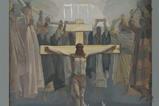Elaine Storkey urges us to embrace the biblical principle of economic justice
Study passage: Leviticus 25:14
This year marks 50 years of fair trade in Britain. I remember its beginning. Tearcraft was an early fair trade project initiated by Tearfund (a Christian Aid and development organisation), as a way of helping people in Bangladesh following a devastating typhoon. A planeload of Bangladeshi handicrafts was imported into Britain, and church members, keen to respond to the desperate need in Bangladesh, bought these goods. Our church was one of many others who organised a stall to display Tearcraft products. Cocoa and coffee became a key area of trade (though I must admit the earliest coffee tasted grim!). Over the next few years Tearcraft widened the range of its trading into food, crafts, clothing, accessories, gifts and cards. Christmas especially was bonanza time, as it took over church halls and premises and sold to Christmas shoppers.
Five years later Richard Adams, who’d worked on Tearcraft, set up a bigger organisation –Traidcraft – to widen the outreach and take trading into new partnerships. The Nicaraguan Solidarity Campaign was one such group. The underlying principles remained the same: to honour all the work and resources that went into producing goods in poor countries and ensure that farmers, suppliers and workers got a fair price for their products. In 1992, after much co-operation, Traidcraft launched the Fairtrade Foundation along with Christian Aid, CAFOD, Oxfam, the World Development Movement and the Women’s Institute. Fairtrade goods were now available beyond the church stalls and could be bought in British supermarkets. With the introduction of the distinctive logo in 2002, their influence spread.
Competition was tough, however, and Fairtrade products were seen more as niche. Fairtrade coffee was often perched on shelves high up (occasionally out of reach) and sometimes went unnoticed. My husband was a committed fair trader, and cheerfully went into our local supermarket to quietly reorganise the shelves and bring the Traidcraft brand down to eye level! Sometimes he bought several packets of coffee himself and then stood at the checkout offering them free to customers who had bought other brands, explaining the Fairtrade principles. I don’t know what the supermarket thought of all this, but they never stopped him! It did take effort from those committed to keep fairly traded goods on the shelves and the agenda, but the sale of goods certainly increased. Now, three decades later, the Fairtrade logo is in outlets everywhere and embedded into our normal trading patterns.
Founded on a biblical principle
Many Christians were very committed to Fairtrade from the start, but others were puzzled. They felt there should be a distinction between spiritual concerns and economic ones. “What does this have to do with Christianity?” they would ask. “Churches ought to be teaching the Bible rather than getting involved in trading patterns – especially when some of those you’re trading with aren’t even Christians themselves.” This response missed the point. It didn’t recognise that fair trade is a biblical principle, not something distant from our faith. It should have been on the agenda of all Bible teaching. What’s more, it’s a principle to be put into practice in our daily lives, not treated as a topic to debate. In the holistic view of the Bible, faithfulness to God includes ethical and just behaviour in every area of life, including economics and trading.
To investigate fair trade in the Bible, we have to begin with the Mosaic Law. At its most fundamental level it’s part of the command to love our neighbour as ourselves, and uphold justice for those who have no voice. One of the first statements is in Leviticus, where the author was outlining various laws that identified the Israelites and their responsibilities before God. Their relationships with each other had to comply with these responsibilities, including economic and business dealings. So, along with the cancellation of debts and the year of Jubilee, the principle of fair trade is stated simply in Leviticus 25:14: “If you sell land to any of your own people or buy land from them, do not take advantage of each other.”
The basic principle was applied within the Jewish community, but then it is extended beyond their own relationships; for just as God had redeemed them from poverty and slavery, so the Israelites were to redeem the poor around them. They were to treat their workers fairly. They were not to take advantage of hired workers or withhold their wages; they were to pay them before sunset (Deuteronomy 24:14-15). Not paying a fair price for hard work is cheating.
The prophets took up the same theme of economic justice and fairness. Ezekiel rebuked the people for their “dishonest trade” (Ezekiel 28:18). They were to use honest scales (Micah 6:11, Proverbs 11:1). They were not to “oppress the poor and crush the needy” (Amos 4:1). The people were not to deprive the foreigner of justice (Malachi 3:5), not to gain from extortion or bribes (Micah 3:11). They were to avoid corruption (Isaiah 33:15-16) and stop exploiting workers (Isaiah 58:3). They were to defend the rights of the poor, the needy and the destitute and to “speak up for those who cannot speak for themselves” (Proverbs 31:8-9). In short, they were to “loose the chains of injustice…to set the oppressed free” (Isaiah 58:6). In so many passages in the Hebrew scriptures the principles of trading fairly are underlined. We are to respect the work and resources of those providing us with goods, and not take advantage of their vulnerability.
Faithfulness to God includes ethical and just behaviour in every area of life
In the New Testament we have many reminders that these principles apply to us also. Jesus was approached by soldiers and tax collectors for advice on how to live before God. He told them not to extort money or cheat people by overcharging tax (Luke 3:12-13). The early Church urged care of the marginalised and took collections for those in need, even when far off (Acts 4:32-35, 1 Corinthians 16:2). The apostle James was especially passionate in his plea for people to ensure worker justice. He pointed to the wages that had not been paid to the workmen who mowed the fields, and said those missing wages were “crying out against you”. To drive the point home, he issued a dire warning: “The cries of the harvesters have reached the ears of the Lord Almighty” (James 5:4).
No one familiar with the Bible can avoid what it says about economic justice as an intrinsic part of our calling and discipleship as Christians. Fairtrade is just one part of that, but it is something every one of us can take on board.
How should we respond today?
At the most basic level we can buy fairly traded goods. They are quality controlled, easy to identify with their distinct logo and nowadays competitively priced. Whenever we use our everyday buying power in this way, we help farmers who grow coffee, cocoa, bananas and other things to become financially secure. Our shopping links us inevitably with those who produce what we buy, and we can ensure that those whose livelihood depends on trading with us are treated fairly.
We can also encourage our churches to publicly support Christian trading organisations who are linked or twinned with initiatives in poorer or middle-income countries and which allow income to reach our Christian brothers and sisters in need. We have a special responsibility to those who follow Jesus and are part of our ‘household of faith’. We can use any gatherings or conferences as opportunities for trading with churches or Christian women’s groups overseas. I was recently at a large gathering of women from central Asia who faced hardship; each country’s delegates had brought clothes, linen, bags and jewellery they’d made. Their craft was stunning. Bringing goods to sell helped those women gain revenue to educate their daughters.
Our shopping links us inevitably with those who produce what we buy
Yet, we have to acknowledge that although all these initiatives have taken some out of poverty, fair trade still has limited impact across the world in terms of economic justice for poorer nations. Those who control the world economy own assets that give them almost unlimited power, and the voices of those who have nothing to bargain with are still disregarded. Recognising this, in the early 2000s more than 60 organisations formed a new coalition, the Trade Justice Movement. Christian NGOs, Fairtrade organisations, development and environmental bodies, trade unions, human rights groups and consumer groups came together to raise awareness of the global scene and campaign for justice. Since then, the Movement has been enormously involved in advocacy, lobbying governments against unfair trade tariffs and in providing expertise to politicians, business, civil society organisations and the media. We can pray for this Movement’s protection and success, add our voices and sign its petitions. But, especially important, we can pray for those Christians at the heart of it – that their witness to God’s love and justice will spill over into everything they do and bring glory to Jesus.


































No comments yet